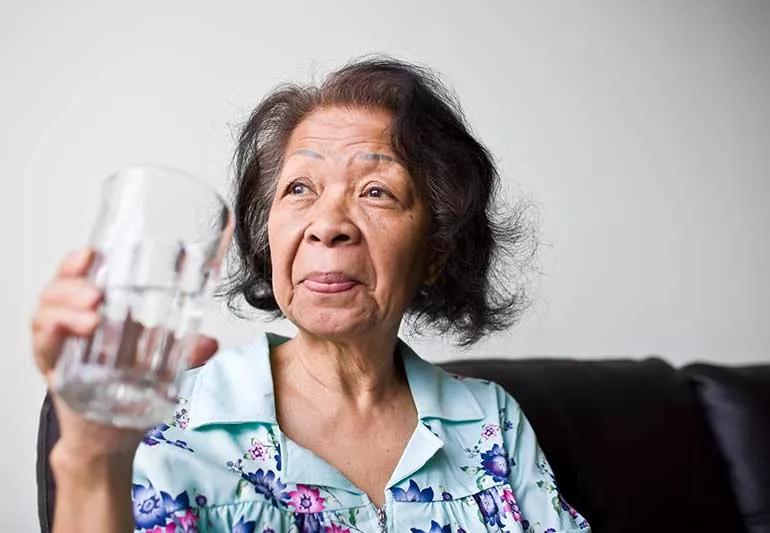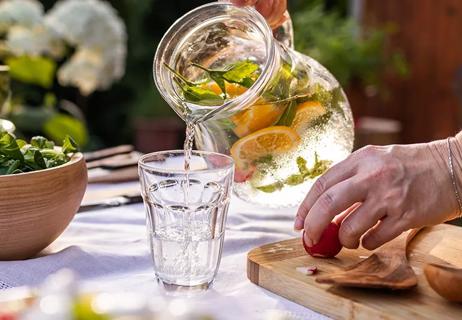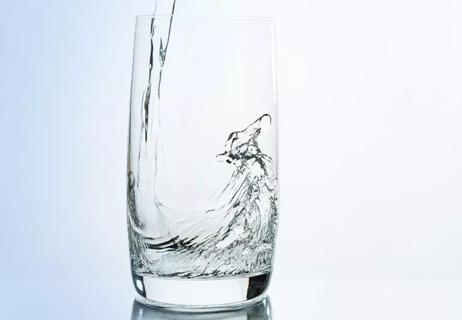Body changes put older adults at increased risk of dehydration

It’s no secret that your body changes as you age. But what may surprise you is that one of those changes involves your sense of thirst.
Advertisement
Cleveland Clinic is a non-profit academic medical center. Advertising on our site helps support our mission. We do not endorse non-Cleveland Clinic products or services. Policy
As you age, your body doesn’t demand water like it used to in your younger years. The issue with that, of course, is that you still need fluids to function — and not drinking enough puts you in danger of dehydration.
Many people aged 65 and older don’t drink enough liquids, says geriatric clinical nurse specialist Anne Vanderbilt, CNS. Let’s take a closer look at the issue and how to best address it.
Older adults are at a greater risk for dehydration because of how body composition changes with age. Those in the 65-and-older crowd simply have less water in their bodies than younger adults or children. Decreased kidney function also can affect fluid levels.
The reduction in thirst that comes with age can keep that already low supply from being replenished. “By the time an older adult feels thirsty, that’s already an indication of early dehydration,” says Vanderbilt.
Water is necessary for nearly every bodily function, from lubricating joints to regulating body temperature and pumping blood to your muscles. Not getting enough of it can have serious health consequences.
That’s why dehydration is a common cause of hospitalization among those 65 and over.
“Adding to the problem is that symptoms of dehydration in older adults often go unrecognized,” she adds. “Symptoms can be easily attributed to other medical conditions, medications or natural effects of aging.”
Advertisement
Dehydration can affect you physically, mentally and emotionally, as blood vessels in your brain and throughout your body constrict due to dwindling fluid levels. Physical signs of dehydration include:
Someone who’s dehydrated also may seem confused, cranky or anxious. (These symptoms may appear worse in someone who has dementia, a group of diseases that can affect memory and behavior. It’s estimated that about 50% of people age 85 and older have dementia.)
Persistent dehydration that causes more severe symptoms can land older adults in an emergency room or hospital.
The best way to prevent dehydration is as obvious as it seems: Consume more fluids. The “eight glasses of water per day” rule is a general recommendation that became popular because it’s easy to remember, explains Vanderbilt.
“But some people definitely can tolerate less, and sometimes, you need more, like in the heat if you’re sweating,” she says. (Learn more about how much fluid you need daily.)
Older adults can work to avoid dehydration by using these tips:
Water is ideal for hydration, but we all know that drinking H2O all day every day can get boring. Make that glass of clear liquid a bit more interesting by dropping in sliced fruit, like lemon or strawberries.
But there are plenty of other options, too. Cow’s milk or milk alternatives offer hydration and nutrition. Ditto for fruit juices. (A lot of juices are high in sugar, though, which can be an issue, especially if you have diabetes. Consider a mix of juice and water if sugar is a concern.)
Caffeinated beverages like tea and coffee can have a diuretic effect, meaning you’ll pee more — an obvious way to lose fluid. So, while it’s OK to enjoy those drinks in moderation, don’t make them a significant part of your daily fluid intake.
Fluid doesn’t have to come out of a glass. It can come from your plate, too.
Many foods are high in water content and can help you stay hydrated. The list includes cucumbers, celery and the aptly named watermelon, which is 91% water. (Frozen fruit ice pops count, too!)
Build hydration into your routine and consistently sip throughout the day, particularly when the temperatures start to climb on hot days. Purchase a nice mug, cup or tumbler to always keep on hand for easy access.
Advertisement
“What I often see in advanced older adults — people in their 80s and 90s — is that they can’t sit down and drink a full 8-ounce glass of water,” notes Vanderbilt. “It fills them up, causes bloating and then, makes them have to run to the bathroom. So, little sips throughout the day are better.”
People with certain medical conditions — heart failure, for example — may have more specific fluid needs. Make sure to consult with your healthcare provider before making significant fluid intake changes.
Avoiding dehydration really is as simple as drinking more fluids, says Vanderbilt. It’s important to stay hydrated at any age, of course, but risks associated with dehydration grow with the number of birthday candles on your cake.
“Drinking water is something you need to focus on more as you age,” she encourages. “Make it a habit — especially since your body might not be sending you the message that you’re thirsty.”
Advertisement
Learn more about our editorial process.
Advertisement

Not drinking enough, drinking too much at once and overdoing it on caffeine can all leave your body short on fluids

Cucumbers, celery and (of course) watermelon are among foods with high water content

Being short on fluid causes hormonal imbalances, brain fog, sleep issues and more

Drink water, of course! But there are also other ways to stay hydrated

Not drinking enough fluids can send your blood pressure on a rollercoaster ride

Dehydration, medication and salty foods are often culprits

Your tolerance decreases with age, thanks to body changes, health conditions and medications you may take

Fans of these trendy ‘mocktails’ claim they combat stress and fatigue, but they’re not your best choice

Wearing a scarf, adjusting your outdoor activities and following your asthma treatment plan can help limit breathing problems

Your diet in the weeks, days and hours ahead of your race can power you to the finish line

When someone guilt trips you, they’re using emotionally manipulative behavior to try to get you to act a certain way